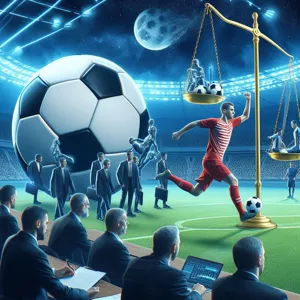In the beautiful game of soccer, the pursuit of fairness has always been a fundamental principle, echoing the sport’s values of sportsmanship and respect.
However, as the game evolves, so too do the ethical dilemmas that confront players, coaches, and governing bodies alike. From contentious refereeing decisions and VAR controversies to issues surrounding player conduct, diversity, and the commercialization of the sport, the landscape of soccer is increasingly complex. In this blog post, we will delve into the multifaceted ethical considerations that shape today’s soccer world. Join us as we explore how the quest for fair play is challenged and redefined in modern soccer, raising important questions about integrity, accountability, and the very essence of what it means to play the game fairly. Whether you’re a passionate fan, a player, or simply someone interested in the moral implications of sports, this discussion will illuminate the pressing fairness issues that resonate beyond the pitch.
1. Introduction to Fairness in Soccer

In the ever-evolving landscape of soccer, fairness is a cornerstone principle that underpins the integrity of the game. As fans fill the stands and players take to the pitch, the notion of fairness extends beyond merely adhering to the rules; it embodies the spirit of competition, respect, and equality. In recent years, however, the concept of fairness has come under scrutiny, raising important ethical questions about how the game is played, officiated, and governed.
From contentious referee decisions that leave players and fans fuming, to the disparities in resources available to clubs across different leagues, the debate surrounding fairness is as complex as the game itself. With the rise of technology in officiating, such as VAR (Video Assistant Referee), and the ongoing discussions about player conduct, it’s crucial to consider how these elements impact the perception of fairness in soccer.
Moreover, fairness in soccer isn’t just confined to the pitch; it resonates through broader societal issues such as inclusivity, diversity, and the treatment of players from various backgrounds. As the world becomes increasingly interconnected, the ethical implications of these considerations cannot be ignored. This blog post will delve into the various dimensions of fairness in soccer, exploring historical contexts, current challenges, and the potential pathways for creating a more equitable environment for all involved in the beautiful game. Join us as we kick off this critical discussion on the ethical considerations that are shaping soccer today.
2. Historical Context: Fairness in the Evolution of the Game
To truly understand the ethical considerations surrounding fairness in today’s soccer landscape, we must first explore its rich historical context. Soccer, or football as it is known outside of North America, has evolved dramatically since its inception in the mid-19th century. Initially played in local parks and streets, the game lacked standardized rules, leading to a chaotic and often violent atmosphere. The establishment of the Football Association in 1863 marked a pivotal moment, introducing regulations that aimed to level the playing field and promote fair competition.
As the sport gained popularity and spread across the globe, the principles of fairness became increasingly intertwined with its identity. The introduction of the offside rule, the implementation of fouls and penalties, and later, the creation of governing bodies like FIFA, all signified society’s growing commitment to ensuring fair play. However, these developments were not without controversy. Disparities in resources, access to training facilities, and biases in officiating began to emerge, raising questions about equality among teams and players.
In the latter half of the 20th century, the commercialization of soccer added another layer to the discussion of fairness. With the influx of money into the game, disparities in wealth began to shape competition, leading to a situation where affluent clubs could easily stockpile top talent while smaller teams struggled to keep pace. This financial imbalance has prompted debates about fair play regulations, salary caps, and the ethics of financial fair play initiatives, which aim to create a more equitable environment.
As we delve deeper into the modern era, issues such as technological advancements—like VAR (Video Assistant Referee)—and their impact on the game further complicate the notion of fairness. While these technologies are introduced to enhance accuracy and reduce human error, they also spark discussions about the integrity of the game and the subjective nature of what constitutes a fair decision.
Understanding the historical trajectory of fairness in soccer not only illuminates the complexities of the current ethical landscape but also serves as a reminder of the ongoing struggle to balance tradition and innovation in a sport that continues to capture the hearts of millions. As we move forward, it is essential to reflect on these historical lessons and strive for a future where fairness is not just an ideal but a fundamental reality in every match played.
3. Defining Fairness: What Does It Mean in Soccer?

Defining fairness in soccer is a complex endeavor, as it encompasses a myriad of factors that influence the game both on and off the pitch. At its core, fairness in soccer refers to the equitable treatment of players, teams, and officials, ensuring that everyone has an equal opportunity to compete and succeed based on their skills and abilities. However, this concept goes far beyond just the rules of the game; it intertwines with ethical principles, social justice, and the integrity of the sport itself.
In the realm of soccer, fairness can manifest in various ways. For instance, the implementation of rules designed to protect players from harm, such as regulations against violent tackles or discriminatory behavior, is a fundamental aspect of maintaining fairness. Moreover, the introduction of technology, like VAR (Video Assistant Referee), aims to create a more just playing field by minimizing human error in officiating. Yet, the use of technology also raises its own set of ethical dilemmas, as debates continue regarding its impact on the flow of the game and the subjective nature of certain decisions.
Moreover, fairness extends to the treatment of players and teams in terms of resources and opportunities. Disparities in funding, training facilities, and access to high-level competition can lead to an uneven playing field, undermining the very essence of fair competition. The increasing commercialization of soccer further complicates this landscape, as wealthy clubs often dominate the market, leaving smaller teams struggling to keep up.
Ultimately, defining fairness in soccer requires a holistic approach that considers the sport’s governance, its cultural implications, and the values it promotes. As fans, players, and officials navigate the evolving challenges of the modern game, it is crucial to engage in ongoing discussions about what fairness truly means and how it can be upheld in a sport that holds such profound significance in the hearts of millions around the globe.
4. The Role of Referees and VAR in Ensuring Fairness
In the fast-paced world of soccer, where every second counts and emotions run high, the role of referees and the Video Assistant Referee (VAR) system has never been more critical in upholding the integrity of the game. Traditionally, referees have been the gatekeepers of fairness on the pitch, tasked with making split-second decisions that can alter the course of a match. Their authority is paramount, yet human error is an undeniable reality in any sport. This is where VAR steps in, aiming to provide a safety net for those high-stakes decisions that can influence outcomes.
Referees, with their keen eye for the game, are responsible for enforcing the rules, ensuring player safety, and maintaining the flow of the match. However, even the most experienced officials can miss pivotal moments. The introduction of VAR has been touted as a technological revolution in soccer, designed to assist referees by reviewing key incidents such as goals, penalties, and red card decisions. This system has sparked both praise and criticism, igniting debates about its impact on the flow of the game and the nature of officiating.
While VAR aims to enhance fairness, it also raises ethical considerations. The balance between technology and human judgment is delicate; an overreliance on VAR can lead to lengthy stoppages and disrupt the rhythm of play, frustrating players and fans alike. Moreover, the interpretation of decisions can still be subjective, leaving room for inconsistency. As we witness this evolving landscape, the challenge remains for governing bodies to refine the use of VAR, ensuring it complements rather than complicates the beautiful game.
Ultimately, the effectiveness of referees and VAR in ensuring fairness hinges on their ability to adapt to the dynamic nature of soccer. Striking the right balance between technology and human insight is essential, as we strive for a game that is not only thrilling but also just. As fans, players, and officials navigate this intricate relationship, the quest for fairness continues, reminding us that while the game may be played on the field, its ethical implications resonate far beyond the final whistle.
5. Controversial Calls: Analyzing Recent High-Profile Incidents

In the world of soccer, where emotions run high and stakes are even higher, controversial calls have become an all-too-frequent topic of discussion. Recent high-profile incidents have sparked debates not just among fans, but also within the broader context of sports ethics.
Take, for instance, the infamous handball decision during last year’s World Cup quarter-finals. A pivotal moment that left fans divided; some argued it was a blatant violation, while others claimed it was an honest mistake. The uproar that followed highlighted the fine line referees walk when making split-second decisions that can alter the course of a match—and sometimes, even the fate of a nation.
Another noteworthy incident occurred during a high-stakes league match where VAR (Video Assistant Referee) technology came under fire. Critics contended that the technology, meant to uphold fairness, instead created confusion and inconsistency. The heated discussions that ensued questioned the ethics of relying on technology to make human-like judgments. Should we trust machines to interpret the spirit of the game, or does this compromise the very essence of soccer?
As we delve deeper into these incidents, it’s crucial to consider the ethical implications. How do we balance the integrity of the game with the human element that makes soccer so exhilarating? The line between right and wrong becomes blurred when subjective interpretations collide with the objective nature of technology. These controversies not only affect the teams involved but also shape the fan experience and influence the future of the sport itself.
In the face of such complexity, it is essential for governing bodies, players, and fans alike to engage in thoughtful dialogue about fairness, accountability, and the true spirit of soccer. As we analyze these high-profile incidents, we must ask ourselves: How can the beautiful game maintain its fairness amidst the inevitable controversies that arise?
6. The Impact of Technology on Fairness in Soccer
In the ever-evolving world of soccer, technology has emerged as a double-edged sword, wielding both the power to enhance fairness and the potential to create new ethical dilemmas. From the introduction of Video Assistant Referee (VAR) systems to goal-line technology, advancements are reshaping the way the game is played and officiated. On one hand, these innovations aim to minimize human error and provide more accurate decisions during crucial moments, such as determining whether a goal has been scored or if a foul has occurred within the penalty area.
However, the integration of technology also raises significant questions about the essence of the game. Critics argue that VAR, while intended to promote fairness, can disrupt the flow of play and lead to prolonged delays that frustrate players and fans alike. The contentious nature of its application—what constitutes a clear and obvious error—has sparked debates over the subjectivity still inherent in the decision-making process. Moreover, the reliance on technology may inadvertently diminish the authority of referees, leading to a potential erosion of respect for their judgments.
Beyond the pitch, the implications of technology extend to accessibility and inequality. As clubs invest in sophisticated systems to gain a competitive edge, smaller teams may lack the resources to implement similar technologies, inadvertently widening the gap between elites and underdogs. This dichotomy raises important ethical questions about the principles of fairness and equality that the sport aims to uphold.
Ultimately, the impact of technology on fairness in soccer is a complex interplay of benefits and challenges. As the sport continues to embrace innovation, it is crucial for governing bodies, clubs, and fans alike to engage in ongoing discussions about the ethical considerations that accompany these advancements, ensuring that the beautiful game remains just that—beautiful and fair for all.
7. Fair Play: Understanding the FIFA Fair Play Initiative

The FIFA Fair Play Initiative stands as a beacon of integrity in the world of soccer, emphasizing the fundamental values that go beyond the pitch. Launched in the early 1990s, this initiative seeks to cultivate a culture of respect, sportsmanship, and ethical conduct among players, coaches, officials, and fans alike. At its core, Fair Play is about promoting an environment where the spirit of the game is upheld, and the dignity of all participants is respected.
Understanding the principles of Fair Play involves recognizing the importance of honesty and integrity in competition. FIFA encourages players to adhere to the rules of the game not only in letter but in spirit, fostering an atmosphere where fair competition thrives. This includes discouraging unsportsmanlike behavior such as diving, time-wasting, and verbal abuse, which tarnish the essence of soccer.
The initiative also extends its reach beyond the field, advocating for social responsibility and community engagement. FIFA believes that soccer has the power to unite people and promote social change. Through various campaigns, they encourage clubs and players to engage in community service, support charitable causes, and promote inclusivity within the sport. By doing so, they aim to create a positive impact that resonates with fans and strengthens the bond between the game and society.
In recent years, the Fair Play Initiative has gained renewed attention, especially in light of rising concerns over issues such as corruption, discrimination, and violence in soccer. By emphasizing ethical considerations, FIFA not only aims to restore faith in the sport but also to inspire a new generation of players and fans to champion fair play both on and off the pitch. As we delve deeper into the ethical landscape of soccer today, understanding the significance of the Fair Play Initiative is crucial in recognizing how it shapes the future of the game we love.
8. Player Conduct: Ethical Considerations On and Off the Field
Player conduct is a multifaceted issue that extends far beyond the confines of the soccer field. It encompasses a wide array of ethical considerations that impact not only the game itself but also the broader community, including fans, young athletes, and society at large. In recent years, the behaviors of players have come under increased scrutiny, prompting discussions about the responsibilities that come with being a professional athlete.
On the field, player conduct is often highlighted during critical moments of competition—whether it be a controversial tackle, an unsportsmanlike display, or a theatrical dive to draw a foul. While competitive spirit is integral to soccer, maintaining integrity and respect for opponents, officials, and the game is paramount. Referees face an uphill battle in enforcing the laws of the game when top players exhibit questionable behavior, as it can set a precedent that influences the conduct of younger players who idolize them. The culture of sportsmanship must be cultivated, emphasizing fair play and respect above all else.
Off the field, the ethical responsibilities of players are equally significant. With the power of social media, athletes have a platform that extends their reach and influence. Their words and actions can inspire millions, but they can also have far-reaching consequences if they perpetuate negative stereotypes, engage in discriminatory behavior, or fail to uphold values of respect and inclusiveness. The importance of athletes using their voices to advocate for social issues and engage in community initiatives cannot be overstated. When players take a stand on issues such as racism, mental health, and equality, they not only enhance their personal brand but also contribute to a more positive and progressive environment within the sport.
Moreover, clubs and governing bodies must hold players accountable for their conduct, both on and off the field. Implementing education programs focused on ethics, communication, and the impact of their actions can help players navigate the complexities of their roles as public figures. Ultimately, fostering an environment where ethical conduct is recognized and valued will benefit the entire soccer community, ensuring that the beautiful game remains a respected and cherished sport for generations to come.
9. The Influence of Fan Behavior on Fairness
The influence of fan behavior on fairness in soccer is a multifaceted issue that extends far beyond the pitch. Fans are the heartbeat of the game, creating an atmosphere of passion and excitement that can elevate the performance of players. However, this fervor can also lead to situations that challenge the integrity of the sport. From chants and cheers to boos and jeers, the emotional responses of fans can have profound effects on both referees and players alike.
When a stadium erupts in a chorus of support, players often draw from that energy, pushing their limits to perform at their best. Conversely, hostile environments can create pressure that unfairly influences a referee’s decision-making. The fear of backlash can lead officials to make calls that align with the crowd’s expectations, rather than sticking strictly to the rules. This dynamic raises questions about the impartiality of officiating and whether fan behavior skews the fairness of the game.
Moreover, the rise of social media has amplified fan voices, allowing them to express opinions and grievances instantaneously. While this can foster a sense of community among supporters, it can also perpetuate toxic behavior, such as online harassment aimed at players and referees. Such actions not only affect the mental well-being of those involved but can also tarnish the reputation of the sport, creating a culture where fairness is secondary to personal vendettas.
It is essential for clubs and governing bodies to actively address the impact of fan behavior on fairness. This can involve implementing educational programs that promote respect and sportsmanship, encouraging fans to support their teams positively. By fostering a culture of fairness both on and off the field, soccer can remain a sport that not only excites but also upholds the values of integrity and respect for all participants. The responsibility lies not just with the players and officials but with every supporter who steps into the stands.
10. Discrimination and Equality: Addressing Issues in Soccer
In the world of soccer, where passion meets competition, the beautiful game is not immune to the harsh realities of discrimination and inequality. As the sport continues to evolve, so too must our understanding and approach to these pressing ethical concerns. Discrimination can manifest in numerous forms—be it racial, gender-based, or socio-economic—and it is crucial that the soccer community actively addresses these issues to foster an inclusive environment for all players, fans, and stakeholders.
At the heart of the matter lies the recognition that talent exists in every corner of the globe, yet systemic barriers often prevent individuals from marginalized backgrounds from reaching their full potential. From youth academies to professional leagues, there is a pressing need for policies that promote diversity and inclusion. Initiatives aimed at scouting talent in underrepresented communities, along with training programs designed to empower women and girls in soccer, are vital steps toward leveling the playing field.
Moreover, the role of governing bodies, clubs, and sponsors cannot be understated. These entities must take a stand against discrimination, not merely as a token gesture but as a commitment to long-term change. This includes implementing robust anti-discrimination policies, providing diversity training, and supporting campaigns that raise awareness about equality in the sport.
Fans, too, play a pivotal role in this conversation. The culture within stadiums and online platforms can either perpetuate stereotypes or challenge them. By promoting a zero-tolerance policy towards hate speech and discrimination, supporters can create a more welcoming atmosphere for fans of all backgrounds.
Ultimately, addressing issues of discrimination and equality in soccer requires a collective effort. By nurturing a culture of respect and inclusivity, the beautiful game can truly reflect the diverse world we live in, allowing it to flourish and unite people across boundaries. As we kick off this critical dialogue, let us strive to ensure that every player, regardless of their background, has the opportunity to participate, excel, and celebrate the joy of soccer.
11. The Ethics of Player Transfers and Contracts
In the world of professional soccer, player transfers and contracts serve as the backbone of team dynamics and league operations. However, the ethics surrounding these transactions have become increasingly complex and contentious. As clubs navigate the competitive landscape, the morality of their decisions often comes under scrutiny.
At the heart of this issue is the power imbalance between players and clubs. Traditionally, clubs have wielded significant influence over players’ careers, often dictating terms that can lead to exploitation. Young talents, in particular, can find themselves caught in a web of contractual obligations that limit their freedom and opportunities. The phenomenon of “slave contracts,” where players are bound to a club for extended periods with little room for negotiation, raises serious ethical questions. Are these agreements genuinely beneficial for the players, or do they primarily serve the interests of wealthy clubs?
Moreover, the transfer market itself is rife with ethical dilemmas. The staggering fees involved in player transfers can lead to a culture of commodification, where athletes are increasingly viewed as assets rather than individuals with aspirations and dreams. This commercialization often creates an environment where financial considerations overshadow a player’s wellbeing or career trajectory. Consequently, clubs must grapple with the moral implications of their financial decisions, particularly in light of growing concerns about financial fair play regulations.
Another key aspect in this discussion is the role of agents in player transfers. While agents are essential advocates for players, the potential for conflicts of interest exists, particularly when agents also represent multiple players across different clubs. This situation can lead to questionable tactics and ethical gray areas, making it crucial for the soccer community to establish clear ethical guidelines and practices.
Ultimately, the ethics of player transfers and contracts demand a delicate balance between business interests and the rights and welfare of the players. As the sport evolves, it becomes increasingly imperative for all stakeholders—clubs, players, agents, and governing bodies—to engage in open dialogue and develop policies that prioritize fairness, transparency, and mutual respect. By doing so, soccer can continue to flourish, ensuring that the beautiful game remains just that—beautiful, both on and off the pitch.
12. The Balance Between Competition and Fairness
In the ever-evolving landscape of soccer, the balance between competition and fairness has become a critical point of discussion among players, fans, and governing bodies alike. The essence of the game lies in its competitive spirit, but this very spirit can sometimes overshadow the ethical considerations that are vital for maintaining the integrity of the sport.
Competition drives players to push their limits, often leading to extraordinary displays of skill and teamwork. However, when the pursuit of victory takes precedence over fair play, the foundations of the sport can begin to erode. Instances of unsportsmanlike conduct, controversial referee decisions, and the dark cloud of performance-enhancing drugs have raised questions about the legitimacy of competition.
One of the most significant ethical dilemmas revolves around the implementation of technology in the game. Tools like VAR (Video Assistant Referee) have been introduced to enhance fairness, yet they also bring their own set of challenges. Critics argue that the reliance on technology can disrupt the natural flow of the game and create an air of uncertainty. On the other hand, advocates maintain that it helps ensure that crucial decisions are made accurately, thereby preserving the integrity of the sport.
Moreover, issues such as financial disparities between clubs have led to an uneven playing field, where wealthier clubs can afford to attract top talent, leaving smaller teams at a disadvantage. This imbalance raises concerns about the very essence of competition—if the outcome seems predetermined by financial power rather than skill, the spirit of the game is compromised.
Addressing these ethical considerations requires a delicate balancing act. Soccer’s governing bodies must work diligently to uphold the principles of fair play while still fostering a competitive environment that excites fans and players alike. This involves not only enforcing strict regulations against cheating and corruption but also promoting a culture of respect and integrity within the sport.
As we progress further into the 21st century, the dialogue surrounding competition and fairness in soccer will undoubtedly continue to evolve. It is essential for all stakeholders—players, coaches, officials, and fans—to remain committed to upholding the values that make soccer the beautiful game it is, ensuring that competitiveness does not come at the expense of fairness. By finding this balance, we can create a future where the thrill of competition and the principles of fair play coexist harmoniously on the pitch.
13. Case Studies: Teams That Challenged Fairness
### 13. Case Studies: Teams That Challenged Fairness
In the ever-evolving world of soccer, the quest for fairness has seen various teams and institutions grappling with ethical dilemmas that challenge the core of the sport. A closer examination of specific case studies highlights how teams have navigated complex situations, often standing up against systemic issues that threaten the integrity of the game.
One prominent example is **FC Barcelona** during the 2019-2020 season, when allegations surfaced regarding the club’s financial practices and player contracts. Critics argued that the club’s handling of its finances, specifically in relation to player wages and transfers, created an uneven playing field within La Liga. FC Barcelona found itself at the center of a debate about economic fairness, ultimately prompting discussions on salary caps and financial regulations aimed at ensuring competitive balance among clubs.
Another significant case arose with **Paris Saint-Germain** (PSG) and its controversial dealings in the transfer market. The club’s lavish spending, particularly in acquiring players like Neymar and Kylian Mbappé, spurred accusations of “financial doping,” where wealthier clubs could potentially distort competitive fairness. This led to scrutiny from UEFA and calls for stricter enforcement of Financial Fair Play regulations, challenging the notion of equity in player acquisition and team building.
On the international stage, the **Qatar national team** became a focal point for discussions about fairness during the build-up to the 2022 FIFA World Cup. Allegations regarding the treatment of migrant workers and human rights violations raised ethical questions about the legitimacy of hosting an event in a country with such dubious labor practices. This case not only spotlighted the need for ethical considerations surrounding player and fan welfare but also ignited a broader conversation about how hosting rights are awarded and the responsibilities that come with them.
These case studies illustrate that the issue of fairness in soccer is multifaceted, encompassing financial ethics, labor rights, and competitive balance. As teams navigate these challenges, they play a crucial role in shaping the future of the sport, advocating for greater accountability and ethical standards that ensure soccer remains a game not only defined by skill and passion but also by fairness and integrity. Each confrontation with these ethical dilemmas serves as a reminder of the ongoing journey toward a more equitable playing field for all.
14. Future Directions: Promoting Ethical Practices in Soccer
As the world of soccer continues to evolve, the dialogue surrounding ethical practices within the sport has never been more critical. The future of soccer hinges on our commitment to fostering an environment that not only celebrates athletic prowess but also upholds integrity, respect, and fairness. Promoting ethical practices in soccer requires a multi-faceted approach that addresses various dimensions: governance, player behavior, fan engagement, and corporate responsibility.
One promising direction involves the implementation of stringent governance standards across soccer organizations worldwide. This includes creating transparent systems of accountability that discourage corruption and unethical behavior at all levels, from grassroots clubs to professional leagues. By establishing clear codes of conduct and robust reporting mechanisms, we can ensure that ethical lapses are swiftly addressed and that those in positions of power are held accountable for their actions.
Education is another crucial component in promoting ethical practices. By integrating ethics training into youth development programs, we can instill values of sportsmanship and respect in aspiring players from a young age. Coaches, referees, and players alike should be equipped with the knowledge and tools necessary to navigate ethical dilemmas on and off the pitch. Workshops, seminars, and mentorship programs can foster a culture where integrity is championed, and players feel empowered to speak out against injustices.
Moreover, engaging fans in the conversation around ethics can significantly impact the culture of soccer. Initiatives that promote respectful behavior in stadiums, campaigns against discrimination, and efforts to create a more inclusive environment will resonate positively with supporters. When fans actively participate in promoting ethical standards, they become vital allies in the fight against violence, racism, and other societal issues that plague the sport.
Finally, corporate sponsors and media play a pivotal role in shaping the ethical landscape of soccer. By aligning themselves with organizations that prioritize ethical practices, corporations can help set the tone for the entire sport. Responsible sponsorships and media coverage that highlights positive stories of sportsmanship and ethical behavior can shift the narrative away from scandal and controversy, ultimately reinforcing the values we strive to uphold in soccer.
In conclusion, the future of soccer hinges on our collective willingness to address ethical considerations head-on. By prioritizing governance, education, fan engagement, and corporate responsibility, we can create a more equitable and just environment for players, supporters, and stakeholders alike. Together, we can kick off a new era of integrity and respect in the beautiful game.
15. Conclusion: Rethinking Fairness in the Beautiful Game
As we draw our exploration of fairness in soccer to a close, it becomes increasingly clear that the landscape of the beautiful game is evolving. The notion of fairness, once primarily rooted in the rules of play and the impartiality of referees, now intersects with a myriad of ethical considerations that extend beyond the pitch. The advent of technology, particularly VAR (Video Assistant Referee), has sparked a revolution in how decisions are made, but it has also ignited debates about the very essence of fairness. Is a match still fair if it relies heavily on technology, or does this advancement inadvertently create new forms of bias?
Moreover, issues such as player welfare, financial equity among clubs, and the treatment of marginalized communities within the sport add layers of complexity to our understanding of fairness. The recent calls for greater accountability from governing bodies highlight the need for transparency and ethical governance to ensure that soccer remains a sport accessible and just for all participants—players, fans, and communities alike.
In rethinking fairness, we must consider the broader implications of our decisions, both on and off the field. It is no longer sufficient to simply play by the rules; we must also question who those rules serve and whether they truly foster a spirit of competition that honors the game’s rich tradition. As stakeholders in this beloved sport, we have a responsibility to advocate for practices that uphold integrity, inclusivity, and respect.
Ultimately, the future of soccer hinges on our ability to balance competitive spirit with ethical considerations. By engaging in these critical conversations and championing a more equitable framework, we can ensure that the beautiful game remains not only a source of joy and passion but also a platform for justice and fairness for generations to come.
In conclusion, the landscape of soccer is more complex than ever, and the ethical considerations surrounding the game are crucial to its integrity and future. As we’ve explored in this blog post, issues such as player welfare, fair play, and the impact of technology on officiating all play significant roles in shaping the sport. By addressing these challenges head-on, we can foster a more equitable and respectful environment for players, fans, and stakeholders alike. Whether you’re a player, coach, or passionate supporter, it’s clear that advocating for fairness in soccer is not just a choice but a responsibility. Let’s continue to engage in these important conversations and push for a game that truly embodies the values of sportsmanship and respect. Together, we can ensure that soccer remains a beautiful game, both on and off the field.






